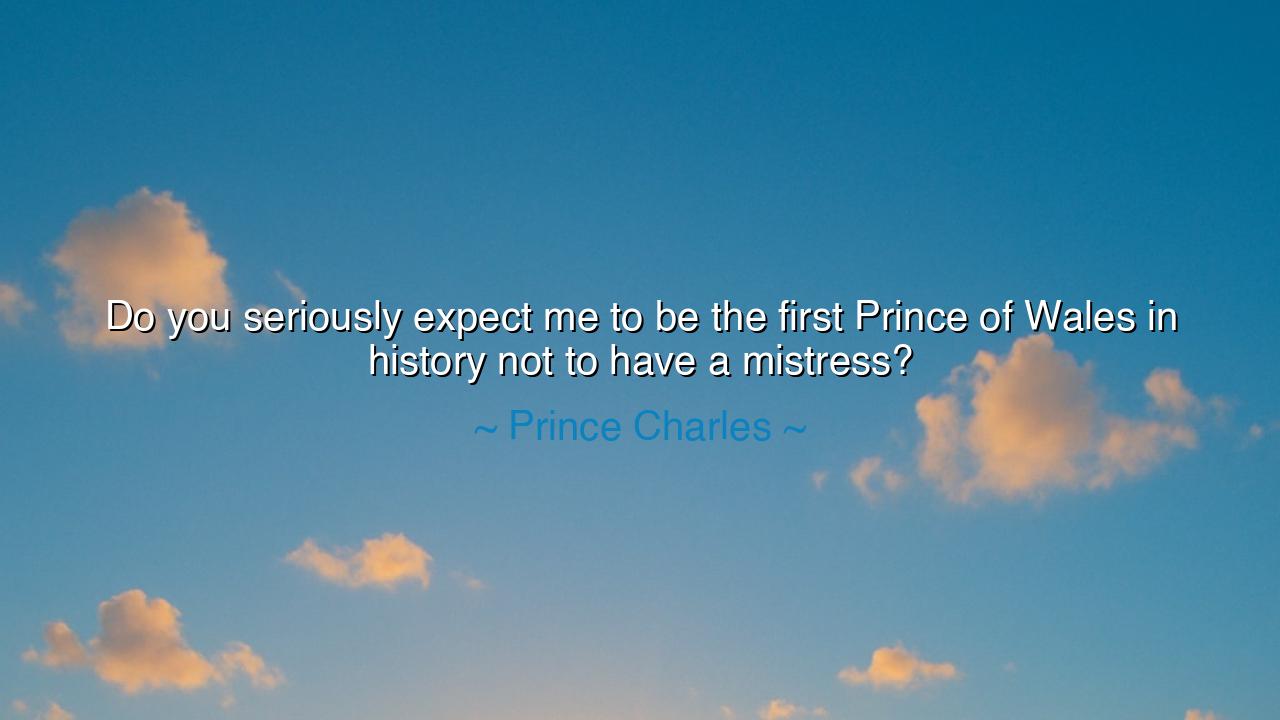
Do you seriously expect me to be the first Prince of Wales in
Do you seriously expect me to be the first Prince of Wales in history not to have a mistress?






“Do you seriously expect me to be the first Prince of Wales in history not to have a mistress?” Thus spoke Prince Charles, heir to the British throne, a man born not merely into privilege but into the suffocating theatre of tradition. These words, both defensive and revealing, were said during the storm of his failing marriage to Princess Diana, a union that dazzled the world in splendor yet crumbled beneath the weight of expectation. In this declaration, Charles did not speak merely of personal weakness, but of the chains of royal precedent — the ancient shadow that falls upon all who inherit crowns. Behind his tone of irony lies a confession: that even princes are bound by history, and that in their gilded palaces, the ghosts of the past whisper what is permissible and what is not.
To understand these words, one must understand the long tradition of monarchy, that ancient system where power is both divine and human, sacred and flawed. The Prince of Wales, as the heir apparent to the British throne, carries centuries of lineage — and with it, the heavy cloak of expectation. In the royal courts of old, kings and princes were seldom men of ordinary morality. Their marriages were contracts of power, their loves affairs of the heart. From Henry VIII, who defied church and crown for passion, to Edward VII, whose mistresses were as renowned as his reign, the British monarchy was built as much on politics as on scandal. In this sense, Charles’s words were less confession than resignation — an acknowledgment that he, too, was caught in the relentless pattern of royal history.
When Prince Charles spoke these words, the world was no longer the world of kings. It was the late twentieth century — an age of cameras, tabloids, and a people who no longer worshipped monarchy but scrutinized it. Yet even so, the habits of the past persisted. His marriage to Diana Spencer, arranged to preserve the dignity of the throne, was a union of duty, not passion. And like many before him, Charles turned elsewhere — to Camilla Parker Bowles, his long-time love and confidante. In the old days, such behavior would have been hidden behind curtains of silence. But in the modern age, the truth became public, and the prince’s defense — “Do you seriously expect me…?” — became a window into the ancient struggle between tradition and conscience, between the crown and the heart.
His words, though spoken with irony, carry a tragic echo. For they reveal how deeply the patterns of history shape the lives of even those who seem most powerful. Charles did not invent his actions; he inherited them. In his world, the sins of the fathers were not forgotten, but institutionalized. To be royal was to perform — to maintain the appearance of perfection while living in the shadow of imperfection. The prince’s remark, therefore, is not only a deflection of guilt but an indictment of the system that made it inevitable. He spoke, perhaps unknowingly, as a man torn between his humanity and his inheritance.
Yet within this scandal, there lies a broader reflection for all people. For are we not all, in some measure, bound by the chains of precedent? How often do we excuse our failings by invoking the weight of those who came before — saying, “It has always been this way”? The prince’s words become a mirror, showing us how easy it is to surrender to history rather than transcend it. But history is not destiny; it is the record of what has been, not a command for what must be. The greatness of a soul — royal or common — is not in conforming to the past, but in daring to rise above it.
Consider King George VI, Charles’s grandfather, who broke the silence of fear to lead his people through the fire of World War II. He was not born to be king — the crown fell to him when his brother, Edward VIII, abdicated for love. Yet George rose to the challenge, stammering yet steadfast, choosing duty over despair. In doing so, he broke the pattern of weakness that had haunted his line and became the symbol of integrity in an age of chaos. He proved that even within the confines of monarchy, character can triumph over custom. His legacy stands as a quiet rebuke to Charles’s words — a reminder that one’s title does not define one’s virtue.
So, my child of the future, take heed of the lesson hidden in the prince’s lament. Do not accept the errors of those before you as your inheritance. When the voices of tradition whisper, “This is how it has always been,” let your conscience reply, “Then it is time for something new.” History does not enslave the wise; it instructs them. Learn from its failings, but never hide behind them. For every man and woman, no matter their station, has the power to shape their destiny anew.
For in the end, Prince Charles’s words, spoken in defense, become a warning for all time: that to justify wrong by appealing to history is to chain oneself to its mistakes. True nobility is not in repeating the patterns of one’s forebears, but in breaking them. Let each generation, then, seek not to imitate history, but to redeem it — and let every crown, whether of gold or conscience, be worn with the courage to change what has always been.






AAdministratorAdministrator
Welcome, honored guests. Please leave a comment, we will respond soon